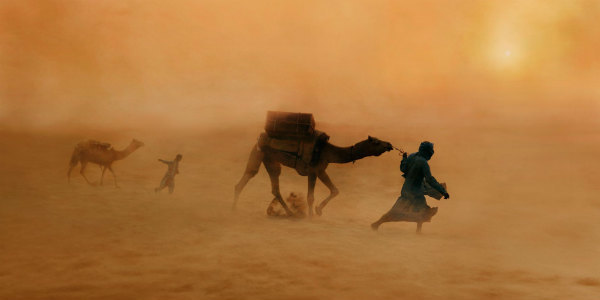FWP:
SETS == DOUBLE ACTIVATION
DESERT: {3,1}
EXISTENCE/NONEXISTENCE: {5,3}
GRANDIOSITY: {5,3}
MADNESS: {14,3}
For background see S. R. Faruqi's choices. This verse is NOT one of his choices; I thought it was interesting and have added it myself. For more on Ghalib's unpublished verses, see the discussion in {4,8x}.
For discussion of expressions compounded with yak , see {11,1}.
The wordplay of the physical 'dust' of the desert versus the metaphorical dust of 'vexation' that afflicts the heart is enjoyably punchy. The heart is imagined as a metal mirror in need of polishing; for more on this see {128,1}; both the literal and the metaphorical senses of the 'dust' are fully activated. Moreover, 'dust of the desert' is wihheld till the last possible moment, to wrap things up in mushairah-verse style. For more examples of 'double activation', see {120,3}. For more such wordplay with ;Gubaar , see {170,4} and {228,3}.
It's possible that the speaker went off 'to nonexistence' not through death or some other happenstance, but by stomping out in a huff, seeking a place where his madness could have the necessary room to spread itself, and sufficient space to move around in.
This verse belongs to the 'snide remarks about the natural world' set; for others, see {4,8x}.

Zamin:
jaulaan-e yak-junuu;N is a measure of breadth/extent. That is, the desert was not even broad enough so that in the very first round of madness I would be able to keep running straight ahead to my heart's content without turning back and making a circle. For there to be 'dust in the heart' means to have ill-will toward someone.
The meaning is that 'In the desert we didn't find even enough breadth to take a single run; thus while we were dying, dust remained in our heart toward the desert'. For dust to remain in the heart toward the desert is an extremely clean/trim thought.
== Zamin, p. 56